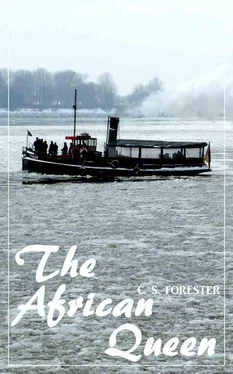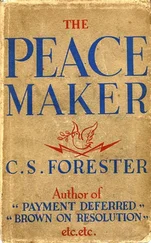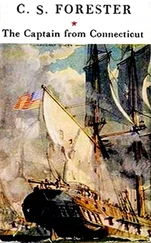Rose put the tiller over and they surged into a narrow channel.
‘Round ’ere again,’ said Allnutt. ‘Steady! There’s a channel ’ere. Bring ’er up into it. Steady! Keep ’er at that!’
They were heading upstream now, in a narrow passage roofed over by trees, whose roots, washed bare by the rushing brown water, and tangled together almost as thick as basket work, constituted the surface of the banks. Against the sweeping current the African Queen made bare headway. Allnutt let go the anchor, and, running back, shut off steam. The launch swung stationary to her mooring with hardly a jerk.
For once in a way Rose had been interested in the manoeuvres, and she filled with pride at the thought that she had understood them—she never usually troubled; when travelling by train she never tried to understand railway signals, and even the Italian first officer had never been able to rouse her interest in ships’ work. But today she had understood the significance of it all, of the necessity to moor bows upstream in that narrow fast channel, in consequence of the anchor being in the bows. Rose could not quite imagine what that fast current would do to a boat if it caught it while jammed broadside on across a narrow waterway, but she could hazard a guess that it would be a damaging business. Allnutt stood watching attentively for a moment to make certain that the anchor was not dragging, and then sat down with a sigh in the sternsheets.
‘Coo,’ he said, ‘it’s ’ot work, ain’t it, miss? I could do with a drink.’
From the locker beside her he produced a dirty enamel mug, and then a second one.
‘Going to ’ave one, miss?’ Allnutt asked.
‘No,’ said Rose, shortly. She knew instinctively that she was about to come into opposition with what Samuel always called Rum. She watched fascinated. From under the bench on which he sat Allnutt dragged out a wooden case, and from out of the case he brought a bottle, full of some clear liquid like water. He proceeded to pour a liberal portion into the tin mug.
‘What is that?’ asked Rose.
‘Gin, miss,’ said Allnutt. ‘An’ there’s only river water to drink it with.’
Rose’s knowledge of strong drink was quite hazy. The first time she had ever sat at a table where it was served had been in the Italian steamer; she remembered the polite amusement of the officers when she and her brother had stiffly refused to drink the purple-red wine which appeared at every meal. During her brother’s ministry in England she had heard drink and its evil effects discussed; there were even bad characters in the congregation who were addicted to it, and with whom she had sometimes tried to reason. At the mission Samuel had striven ineffectively for ten years to persuade his coloured flock to abandon the use of the beer they had been accustomed to brew from time immemorial—Rose knew how very ineffective his arguments had been. And there were festivals when everybody brewed and drank stronger liquors still, and got raging drunk, and made fearful noises, and all had sore heads the next morning, and not even the sore heads had reconciled Samuel to the backsliding of his congregation the night before.
And the few white men all drank, too—although up to this minute Rose, influenced by Samuel’s metaphorical description, had been under the impression that their tipple was a fearsome stuff called Rum, and not this innocent-appearing gin. Rum, and the formation of unhallowed unions with native women, and the brutal conscription of native labour, had been the triple-headed enemy Samuel was always in arms against. Now Rose found herself face to face with the first of these sins. Drink made men madmen. Drink rotted their bodies and corrupted their souls. Drink brought ruin in this world and damnation in the next.
Allnutt had filled the other mug over-side, and was now decanting water into the gin, trying carefully but not very effectively, to prevent too much river alluvium from entering his drink. Rose watched with increasing fascination. She wanted to protest, to appeal to Allnutt’s better feelings, even to snatch the terrible thing from him, and yet she stayed inert, unmoving. Possibly it was that common sense of hers which kept her quiescent. Allnutt drank the frightful stuff and smacked his lips.
‘That’s better,’ he said.
He put the mug down. He did not start being maniacal, nor to sing songs, nor to reel about the boat. Instead, with his sinfulness still wet on his lips he swung open the gates of Paradise for Rose.
‘Now I can think about supper,’ he said. ‘What about a cup o’ tea, miss?’
Tea! Heat and thirst and fatigue and excitement had done their worst for Rose. She was limp and weary and her throat ached. The imminent prospects of a cup of tea roused her to trembling excitement. Twelve cups of tea each Samuel and she had drunk daily for years. Today she had had none—she had eaten no food either, but at the moment that meant nothing to her. Tea! A cup of tea! Two cups of tea! Half a dozen great mugs of tea, strong, delicious, revivifying! Her mind was suffused with rosy pictures of an evening’s tea drinking, a debauch compared with which the spring sowing festivities at the village by the mission station were only a pale shade.
‘I’d like a cup of tea,’ she said.
‘Water’s still boiling in the engine,’ said Allnutt, heaving himself to his feet ‘Won’t take a minute.’
The tinned meat that they ate was, as a result of the heat, reduced to a greasy semi-liquid mass. The native bread was dark and unpalatable. But the tea was marvellous. Rose was forced to use sweetened condensed milk in it, which she hated—at the mission they had cows until von Hanneken commandeered them—but not even that spoilt her enjoyment of the tea. She drank it strong, mug after mug of it, as she had promised herself, with never a thought of what it was doing inside her to the lining of her stomach; probably it was making as pretty a picture of that as ever she had seen at a Band of Hope lantern lecture where they exhibited enlarged photographs of a drunkard’s liver. She gulped down mug after mug. For a moment her body temperature shot up to fever heat, but presently there came a blissful perspiration—not the sticky, prickly sweat in which she moved all day long, but a beneficent and cooling fluid, bringing with it a feeling of ease and well-being.
‘Those Belgians up at the mine wouldn’t never drink tea,’ said Allnutt, tilting the condensed milk tin over his mug of black liquid. ‘They didn’t know what was good.’
‘Yes,’ said Rose. She felt positive friendship for Allnutt welling up within her. She slapped at the mosquitoes without irritation.
When the scanty crockery had been washed and put away Allnutt stood up and looked about him; the light was just failing.
‘Ain’t seen no crocodiles in this arm, miss, ’ave you?’ he asked.
‘No,’ said Rose.
‘No shallows for ’em ’ere,’ said Allnutt. ‘And current’s too fast.’
He coughed a little self-consciously.
‘I want to ’ave a bath before bedtime,’ he said.
‘So do I.’
‘I’ll go up in the bows an’ ’ave mine ’olding on to the anchor chain,’ said Allnutt. ‘You stay down ’ere and do what you like, miss. Then if we don’t look it won’t matter.’
Rose found herself stripping herself naked right out in the open, with only a dozen feet away a man doing the same, and only a slender funnel six inches thick between them. Somehow it did not matter. Rose was conscious that out of the tail of her eye she could see a greyish-white shape lower itself over the launch’s bows, and she could hear prodigious kickings and splashings as Allnutt took his bath. She sat naked on the low gunwale in the stern and lowered her legs into the water. The fast current boiled round them, deliriously cool, tugging at her ankles, insidiously luring her farther. She slipped over completely, holding on to the boat, trailing her length on the surface of the water. It was like Paradise—ever so much better than her evening bath at the mission, in a shallow tin trough of lukewarm water, and obsessed with the continual worry lest the unceasing curiosity of the natives should cause prying eyes to be peering at her through some chink or crevice in the walls.
Читать дальше












